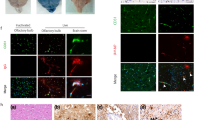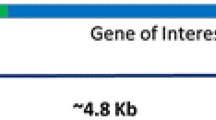Summay
Model systems have shown that adenoviral vector mediated transient gene expression can potentially be applied for the treatment of brain tumours, neurodegenerative diseases and brain injuries. Most studies utilized adenovirus serotype 5 (Ad5) based vectors, which as adhesion molecules require the coxsackie adenovirus receptor (CAR) as a critical determinant for cellular infection. In this report, we have systematically characterized CAR expression in the adult human central nervous system (CNS) by using immunohistochemistry. A total of 85 specimens from various CNS regions were investigated for CAR expression in a cell type-dependent context. The most marked staining positivity was found in the choroid plexus and the pituitary gland. The neocortex had scattered positive neurons, while the white matter was mainly negative.
We need to consider the possible adverse effects and the possible damage caused by adenoviral gene therapy if the virus–vector also binds to normal brain cells.
Similar content being viewed by others
References
Benihoud K, Yeh P, Perricaudet M, Adenovirus vectors for gene deliveryCurr Opin Biotechnol 10: 440–447 1999
Bergelson JM, Cunningham JA, Droguett G, Kurt-Jones EA, Krithivas A, Hong JS, Horwitz MS, Crowell RL, Finberg RW, Isolation of a common receptor for Coxsackie B viruses, adenoviruses 2 and 5Science 275: 1320–1323 1997
Chretien I, Marcuz A, Courtet M, Katevuo K, Vainio O, Heath JK, White SJ, Du Pasquier L, CTX, a Xenopus thymocyte receptor, defines a molecular family conserved throughout vertebratesEur J Immunol 28: 4094–4104 1998
Wickham TJ, Mathias P, Cheresh DA, Nemerow GR, Integrins alpha v beta 3 and alpha v beta 5 promote adenovirus internalization but not virus attachmentCell73: 309–319 1993
Kim M, Zinn KR, Barnett BG, Sumerel LA, Krasnykh V, Curiel DT, Douglas JT, The therapeutic efficacy of adenoviral vectors for cancer gene therapy is limited by a low level of primary adenovirus receptors on tumour cellsEur J Cancer38: 1917–1926 2002
Hemmi S, Geertsen R, Mezzacasa A, Peter I, Dummer R, The presence of human coxsackievirus and adenovirus receptor is associated with efficient adenovirus-mediated transgene expression in human melanoma cell culturesHum Gene Ther 9: 2363–2373, 1998
Rauen KA, Sudilovsky D, Le JL, Chew KL, Hann B, Weinberg V, Schmitt LD, McCormick F, Expression of the coxsackie adenovirus receptor in normal prostate and in primary and metastatic prostate carcinoma: potential relevance to gene therapyCancer Res 62: 3812–3818, 2002
Douglas JT, Kim M, Sumerel LA, Carey DE, Curiel DT, Efficient oncolysis by a replicating adenovirus (ad) in vivo is critically dependent on tumor expression of primary ad receptorsCancer Res 61: 813–817, 2001
Tomko RP, Xu R, Philipson L, HCAR and MCAR: the human and mouse cellular receptors for subgroup C adenoviruses and group B coxsackievirusesProc Natl Acad Sci USA94: 3352–3356 1997
Cohen CJ, Shieh JT, Pickles RJ, Okegawa T, Hsieh JT, Bergelson JM, The coxsackievirus and adenovirus receptor is a transmembrane component of the tight junction Proc Natl Acad Sci USA98: 15191–15196 2001
Walters RW, Freimuth P, Moninger TO, Ganske I, Zabner J, Welsh MJ, Adenovirus fiber disrupts CAR-mediated intercellular adhesion allowing virus escape Cell 110: 789–799 2002
Fuxe J, Liu L, Malin S, Philipson L, Collins VP, Pettersson RF, Expression of the coxsackie and adenovirus receptor in human astrocytic tumors and xenograftsInt J Cancer 103: 723–729 2003
Grill J, Van Beusechem VW, Van Der Valk P, Dirven CM, Leonhart A, Pherai DS, Haisma HJ, Pinedo HM, Curiel DT, Gerritsen WR, Combined targeting of adenoviruses to integrins and epidermal growth factor receptors increases gene transfer into primary glioma cells and spheroidsClin Cancer Res 7: 641–650 2001
Fechner H, Haack A, Wang H, Wang X, Eizema K, Pauschinger M, Schoemaker R, Veghel R, Houtsmuller A, Schultheiss HP, Lamers J, Poller W, Expression of coxsackie adenovirus receptor and alphav-integrin does not correlate with adenovector targeting in vivo indicating anatomical vector barriersGene Ther 6: 1520–1535, 1999
Sachs MD, Rauen KA, Ramamurthy M, Dodson JL, De Marzo AM, Putzi MJ, Schoenberg MP, Rodriguez R, Integrin alpha(v) and coxsackie adenovirus receptor expression in clinical bladder cancerUrology60: 531–536, 2002
Jee YS, Lee SG, Lee JC, Kim MJ, Lee JJ, Kim DY, Park SW, Sung MW, Heo DS, Reduced expression of coxsackievirus and adenovirus receptor (CAR) in tumor tissue compared to normal epithelium in head and neck squamous cell carcinoma patients Anticancer Res 22: 2629–2634, 2002
Noutsias M, Fechner H, de Jonge H, Wang X, Dekkers D, Houtsmuller AB, Pauschinger M, Bergelson J, Warraich R, Yacoub M, Hetzer R, Lamers J, Schultheiss HP, Poller W, Human coxsackie–adenovirus receptor is colocalized with integrins alpha(v)beta(3) and alpha(v)beta(5) on the cardiomyocyte sarcolemma and upregulated in dilated cardiomyopathy: implications for cardiotropic viral infectionsCirculation 104: 275–280, 2001
Hotta Y, Honda T, Naito M, Kuwano R, Developmental distribution of coxsackie virus and adenovirus receptor localized in the nervous systemBrain Res Dev Brain Res 143: 1–13, 2003
Ito M, Kodama M, Masuko M, Yamaura M, Fuse K, Uesugi Y, Hirono S, Okura Y, Kato K, Hotta Y, Honda T, Kuwano R, Aizawa Y, Expression of coxsackievirus and adenovirus receptor in hearts of rats with experimental autoimmune myocarditisCirc Res 86: 275–280, 2000
Fechner H, Noutsias M, Tschoepe C, Hinze K, Wang X, Escher F, Pauschinger M, Dekkers D, Vetter R, Paul M, Lamers J, Schultheiss HP, Poller W, Induction of coxsackievirus–adenovirus-receptor expression during myocardial tissue formation and remodeling: identification of a cell-to-cell contact-dependent regulatory mechanism Circulation107: 876–882 2003
Nasuno A, Toba K, Ozawa T, Hanawa H, Osman Y, Hotta Y, Yoshida K, Saigawa T, Kato K, Kuwano R, Watanabe K, Aizawa Y, Expression of coxsackievirus and adenovirus receptor in neointima of the rat carotid arteryCardiovasc Pathol13: 79–84, 2004
Mallam JN, Hurwitz MY, Mahoney T, Chevez-Barrios P, Hurwitz RL, Efficient gene transfer into retinal cells using adenoviral vectors: dependence on receptor expression Invest Ophthalmol Vis Sci 45: 1680–1687 2004
Baekelandt V, De Strooper B, Nuttin B, Debyser Z, Gene therapeutic strategies for neurodegenerative diseasesCurr Opin Mol Ther2: 540–554 2000
Bauerschmitz GJ, Barker SD, Hemminki A, Adenoviral gene therapy for cancer: from vectors to targeted and replication competent agents (review)Int J Oncol21: 1161–1174, 2002
Li Y, Pong RC, Bergelson JM, Hall MC, Sagalowsky AI, Tseng CP, Wang Z, Hsieh JT, Loss of adenoviral receptor expression in human bladder cancer cells: a potential impact on the efficacy of gene therapyCancer Res59: 325–330 1999
Cripe TP, Dunphy EJ, Holub AD, Saini A, Vasi NH, Mahller YY, Collins MH, Snyder JD, Krasnykh V, Curiel DT, Wickham TJ, DeGregori J, Bergelson JM, Currier MA, Fiber knob modifications overcome low, heterogeneous expression of the coxsackievirus–adenovirus receptor that limits adenovirus gene transfer and oncolysis for human rhabdomyosarcoma cellsCancer Res 61: 2953–2960 2001
Vecil GG, Lang FF, Clinical trials of adenoviruses in brain tumors: a review of Ad-p53 and oncolytic adenovirusesJ Neurooncol65: 237–246, 2003
Acknowledgements
The authors thank Onyx Pharmaceuticals Inc, Richmond, CA, USA for the generous gift of the antibody and Katherine Rauen, Cancer Research Institute, University of California, San Francisco, CA, USA for mediating information. This work was supported by the Märit and Hans Rausing Charitable Foundation, the Swedish Cancer Society and Gunnar Nilsson's Cancer Foundation.
Author information
Authors and Affiliations
Corresponding author
Rights and permissions
About this article
Cite this article
Persson, A., Fan, X., Widegren, B. et al. Cell type- and region- dependent coxsackie adenovirus receptor expression in the central nervous system. J Neurooncol 78, 1–6 (2006). https://doi.org/10.1007/s11060-005-9055-3
Received:
Accepted:
Published:
Issue Date:
DOI: https://doi.org/10.1007/s11060-005-9055-3




